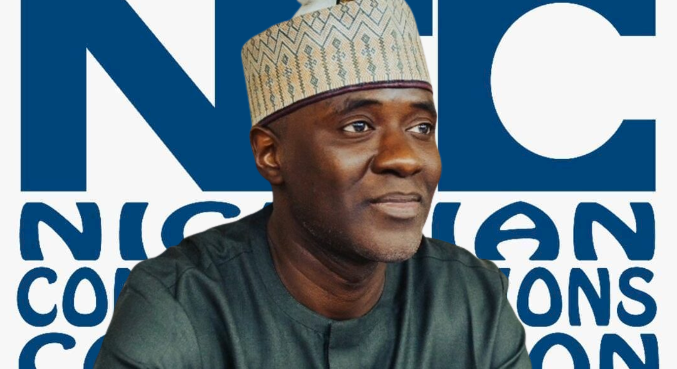Infotech
Galaxy Backbone’s CEO extends Eid-ul-Fitr greetings to muslims

Prof. Ibrahim A Adeyanju, the Managing Director and Chief Executive Officer of Galaxy Backbone has extended warm greetings and heartfelt wishes to the Muslim Ummah in Nigeria and across the globe on the occasion of Eid-ul-Fitr. T
In a message signed by him, the MD said the joyous celebration marks the end of the holy month of Ramadan, a time of spiritual reflection, self-discipline, and devotion.
“Eid-el-Ftir, also known as the Festival of Breaking the Fast, is a time of unity, compassion, and gratitude. I urge all Muslims to embrace the lessons learned during Ramadan and carry them forward into their daily lives.” He said.
Continuing, Prof.Adeyanju said “The virtues of tolerance, love, and understanding should guide our actions as we interact with people of different backgrounds and beliefs.”
Recognizing the pivotal role of leadership in advancing the nation, he encouraged the Muslim community to pray for peace and development in Nigeria and specifically emphasizes the need for prayers to support President Bola Ahmed Tinubu’s renewed hope administration.
Under his leadership, Galaxy Backbone remains committed to providing cutting-edge ICT infrastructure and services to empower government institutions, businesses, and individuals across Nigeria. As we celebrate this auspicious occasion, Galaxy Backbone renews its dedication to supporting the digital transformation of the nation, enabling connectivity, innovation, and socio-economic growth.
Galaxy Backbone is the Digital Infrastructure and Services organization committed to providing Cloud, Colocation, Cybersecurity and Connectivity services and solutions that transform organisations within the public and private sector.
Infotech
Airtel’s market share increases in latest telecom sector report


In a recent revelation from the Nigerian Communications Commission (NCC), Airtel Nigeria has emerged as a standout performer in the country’s telecommunications sector, marking significant gains in market share over the past year. According to the NCC data, by the end of March 2024, Airtel Nigeria has grown its market share over the last year into a remarkable 29 percent, solidifying its position as a leading telecom provider in the region.
In stark contrast, other mobile network operators such as MTN and 9mobile have faced considerable setbacks, with MTN witnessing a notable 3.19 percent decline in market share and 9mobile experiencing a 0.5 percent decrease. Even Glo, a prominent player in the market, saw a decline, albeit less pronounced, with a 0.58 percent drop in its share of internet subscribers.
Airtel Nigeria’s success story goes beyond market share gains. The company has also witnessed a substantial surge in its share of internet subscribers, boasting an impressive 165 percent basis points increase. This surge correlates with the launch of Airtel 5G, which the company began rolling out in June 2023 and underscores the telco’s continued push to grow its customer base nationwide.
Airtel Nigeria’s ascendancy in the telecom market comes at a pivotal moment when mobile network operators face challenges of rising operations cost and exchange rates volatility. The company’s recent results solidify its position as a frontrunner in Nigeria’s telecom landscape.
Infotech
Coker-Odusote at 40: An example of an industrious technocrat in the public sector


By Ayodele Babalola
April 26 marks an extraordinary milestone as the Director-General of the National Identity Management Commission (NIMC), Engr. Abisoye Coker-Odusote, one of Nigeria’s finest female professionals celebrates her 40th birthday.
Reflecting on Coker-Odusote’s 40 years of existence, it is clear that her journey had been nothing short of extraordinary and remarkable strides.
From humble beginnings to her current position at the helm of NIMC, she has overcome numerous challenges and obstacles with grace and resilience. Her story is a robust proof of perseverance and determination. It is a stark reminder that with hard work and dedication, anything is possible.
For those who have followed her trajectory closely, Abisoye Coker-Odusote embodies the essence of visionary leadership. This is no surprising given the altitude of her fledging career. Her rise to prominence has been characterised by a relentless pursuit of innovation and efficiency. Since her assumption of office last year as the NIMC boss, the commission has undergone a profound evolution, embracing cutting-edge technologies and pioneering innovative solutions to address the challenges of identity verification and authentication in the country. Coker-Odusote has not only achieved extraordinary milestones but has also set new standards of excellence in the field of identity management.
Her leadership has led to unprecedented growth and progress in NIMC, significantly advancing the country’s digital identity infrastructure. One of Engr. Coker-Odusote’s most notable achievements is her relentless advocacy for the adoption of digital identity solutions, which enhance security, efficiency, and inclusivity. She has spearheaded groundbreaking projects that aim to expand access to digital identity services, particularly in underserved communities.
Under her guidance, NIMC has played a pivotal role in empowering millions of Nigerians with secure and verifiable identities, laying the foundation for a more inclusive and digitally enabled society. Additionally, she has expedited the enrollment and distribution of National Identification Numbers (NINs) to all Nigerians and legal residents while also streamlining and integrating existing identity databases across the country.
Engineer Coker-Odusote’s impact extends far beyond the confines of her role at NIMC. She is a tireless advocate for inclusive identity management policies, recognising the fundamental importance of ensuring that every Nigerian has access to secure and reliable identification. Her advocacy efforts have contributed to greater awareness and engagement on issues of identity management, paving the way for meaningful change and progress.
To delve into her credentials and wealth of experience is to probe into a horde of narratives of excellence. With over 18 years of experience in managing complex and sensitive projects across various sectors, Coker-Odusote is a professionally trained tech enthusiast who has held roles that improved stakeholders’ engagements and execution of digital transformation projects.
She had once served as the General Manager/CEO of the Lagos State Infrastructure Maintenance and Regulatory Agency (LASIMRA), where she oversaw vital utility infrastructure providers – telecommunication, power, and gas operators – to promote standards and procedures in infrastructural development and maintenance.
Her impressive journey also includes serving as the Head of Information Technology & Communication at Bate Litwin, an engineering company working on projects such as Chevron ESA (JV with Atlas). Coker-Odusote’s diverse experience also encompasses her time in the United Kingdom and Nigeria.
Indeed, prior to the announcement of her appointment by President Bola Tinubu, she was the General Manager/CEO at LASIMRA where as, earlier noted, she supervised crucial utility infrastructure providers, including telecommunication, power, and gas operators.
Beyond her professional accomplishments, she is also a passionate advocate for gender equality and women’s empowerment in STEM fields. As a trailblazing female leader in a male-dominated industry, she serves as a role model and mentor to aspiring women in technology, inspiring them to pursue their dreams and break down barriers to success. Through her leadership and advocacy, Coker-Odusote is helping to create a more diverse and inclusive workforce, where talent and innovation thrive regardless of gender.
On this day, we pay tribute to Coker-Odusote’s outstanding achievements, innovative leadership, unwavering commitment to excellence, and profound impact on Nigeria’s identity management landscape.
She is an inspiration to us all, motivating us to continue striving for excellence and to never lose sight of our goals. As she enters a new decade of her life, may her journey be filled with even greater success, fulfillment, and prosperity.
Infotech
Nurturing local talents to handle digital economy is necessary – NCC


The Nigerian Communication Commission (NCC) says it is necessary to nurture a generation of Information and Communication Technology (ICT) specialists equipped to handle the complexities of digital economy.
Mr Aminu Maida, the Executive Vice-Chairman, NCC, said this during the 2nd edition of the West African Telecoms Infrastructure Summit and Exhibition on Friday in Lagos.
Maida, represented by Mr Victor Adoga, Head, Next Generation Technology and Standards, NCC, said developing local talents was crucial to adapting to emerging technology trends.
On emerging trends, he said the rollout of 5G networks was a transformative trend in telecoms infrastructure.
According to him, 5G promises higher speeds, lower latency and greater capacity, facilitating new applications such as Internet of Things (IoT), autonomous vehicles, smart cities and advanced augmented reality.
“The future beyond 5G, looking towards 6G, suggests further enhancements in network capabilities and the integration of Artificial Intelligence (AI) to manage network operations and service delivery.
“It requires substantial investments in both hardware and spectrum allocation.
“With Internet of Things (IoT), everyday objects are connected to the internet, gathering and sharing data,” he said.
Maida said that the 6G revolution would transform industries from agriculture to healthcare, creating efficiencies and improving lives.
According to the NCC boss, for telecoms, it means massive increase in connected devices and shift in data management strategies.
Maida also said that the backbone of any robust digital economy was its fiber optic network,
He stressed that expanding fiber optic infrastructure was essential to increasing bandwidth and improving internet quality across Nigeria.
On data localisation and security, he said that there was the need to protect and manage the vast amounts of data generated as digital services grew.
Maida said that strengthening data security measures and establishing data centres locally would be crucial in maintaining user trust and complying with global data protection regulations.
He also noted that to delve into these trends, strategic actions such as partnerships between government, industry, and academia to drive innovation and development must be considered.
Maida added that such collaborations could lead to sharing infrastructure models that reduced costs and improved service delivery.
He said that developing telecoms infrastructure required capital, adding that public-private partnerships, infrastructure funds, and innovative financing models like Infrastructure as a Service (IaaS) could be key to meeting financial demands.
“Another thing is to build our infrastructure, and sustainability must be a priority. This includes not only environmental considerations but also building systems that are economically and socially sustainable.
“Integration with AI and machine learning to optimise network management, predict maintenance needs, and enhance customer service through automation and advanced analytics is also necessary.
“Another strategy is developing smart infrastructure, because as cities become smarter, telecom infrastructure must evolve to support an array of smart city applications, from traffic management systems to public safety solutions,” he said.
Speaking on challenges in the industry, Maida said: “Today, we boast of over 219 million mobile subscribers and a burgeoning tech-savvy population eager to harness digital technologies.
“However, while our growth has been remarkable, it has not been without its challenges.
“Issues such as uneven service distribution, infrastructural deficits, and regulatory uncertainties have occasionally hindered our progress.
“Yet, each challenge also presented a unique opportunity for growth and innovation,” he said.
Maida said that how this path was navigated would determine the role Nigeria played in the global digital landscape.
-
capital market2 years ago
Rt.briscoe, FBNH, Others halts negative performance of stock market
-
Finance3 months ago
Court orders Sen. Victor Umeh to repay N136m bank debt to AMCON
-



 Abuja Update2 months ago
Abuja Update2 months agoUNDP, FG partnership needed to achieve inclusion, equity- Minister
-
Abuja Update1 month ago
Banks drive stock market performance with N147bn gain
-



 Health2 weeks ago
Health2 weeks agoCapacity training will reduce migration of health workers- NPHCDA
-



 Business1 week ago
Business1 week agoTingo Group unveils Tingo Electric, Tingo Cola drink at Lagos launch
-



 Infotech4 weeks ago
Infotech4 weeks agoWorld Backup Day: NITDA urges Nigerians to ensure backup of data
-
News4 months ago
Oil thieves sponsoring malicious media campaign against Navy – Spokesman








